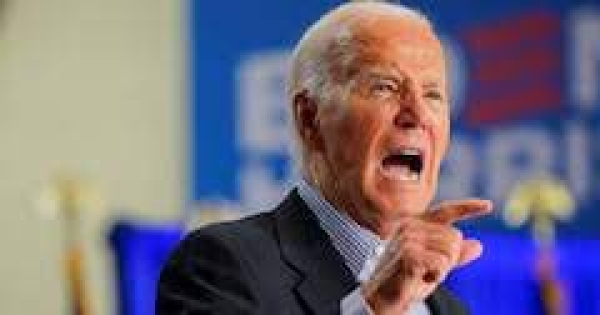Biden endorsed Vice President Kamala Harris to replace him at the top of the ticket.
“It has been the greatest honor of my life to serve as your President,” Biden said in a statement. “And while it has been my intention to seek reelection, I believe it is in the best interest of my party and the country for me to stand down and to focus solely on fulfilling my duties as President for the remainder of my term.”
In a separate statement, Biden called naming Harris as his running mate in 2020 “the best decision” he has made.
“Today I want to offer my full support and endorsement for Kamala to be the nominee of our party this year. Democrats — it’s time to come together and beat Trump. Let’s do this,” he wrote on X, formerly known as Twitter.
Biden’s withdrawal from the race comes just over three weeks after his first presidential debate against former President Donald Trump. Biden’s halting and unsteady performance in the June debate was widely regarded as a debacle among Democratic elites and donors, sparking a chorus of calls from elected officials, donors and many prominent commentators for Biden, 81, to step aside and not run for a second term.
Biden said he will serve out the remainder of his term and said he will “speak to the Nation” later this week in more detail about my decision.
As Biden’s 2024 running mate, Harris is positioned to assume Biden’s place on the ticket — including assuming control of most of his campaign resources and infrastructure.
In his statement, Biden touted his administration’s accomplishments over the past three and a half years.
“Together, we overcame a once in a century pandemic and the worst economic crisis since the Great Depression. We’ve protected and preserved our Democracy. And we’ve revitalized and strengthened our alliances around the world.”
Biden thanked Harris for being “an extraordinary partner in all this work.”
Because Biden withdrew before Democratic delegates were set to cast their votes in a virtual roll call, delegates are now free to cast their votes for other candidates at the Democratic National Convention.
Twice, Biden’s decisions not to seek the Democratic nomination for president have paved the way to Democratic women to go toe-to-toe with Trump. After Biden decided against running in 2016, Trump defeated former Secretary of State Hillary Clinton, the first woman to be a major party’s presidential nominee. Now, Biden passes the mantle to Harris to face off against Trump with under four months to go until Election Day.
If Harris were to be elevated as the Democratic nominee, she would surely face her another level of intense scrutiny as Democrats weigh their next steps.
Harris, who is Black and Indian-American, made history as the first woman and person of color to serve as vice president when she took office in 2021.
Harris, a former U.S. senator and California attorney general, would be running to be the first woman and woman of color to be president. Harris would be the first president of Asian descent and second Black and multiracial president after Barack Obama.
Harris, 59, was born in Oakland, California, to her mother, Shyamala Gopalan, a biologist and cancer researcher, and her father, Donald Harris, an economist. She attended Howard University for her undergraduate degree and later earned a law degree from the University of California, Hastings College of Law.
Harris saw a meteoric rise from local prosecutor to vice president in two decades. She began her career working in the Alameda and San Francisco district attorney’s offices before being elected as San Francisco’s district attorney in 2003. She was elected attorney general of California in 2010, and in 2016, she ran for and was elected to the U.S. Senate seat vacated by former Sen. Barbara Boxer. In 2020, Biden selected Harris as his running mate.
In the vice president’s office, Harris’ portfolio has included voting rights and addressing the root causes of migration from the Northern Triangle Region of Central America — notoriously difficult policy issues for Democrats on which the White House made little progress.
If nominated, Harris would be arguably the most forceful supporter of abortion rights to represent a major political party. As vice president, she has emerged as a vocal critic of the Supreme Court’s decision in Dobbs v. Jackson Women’s Health Organization to eliminate federal abortion rights, as well as of subsequent state abortion bans. In March, Harris toured an abortion clinic in Minnesota, in what is believed to be the first such trip by a sitting president or vice president.
Harris’ emphasis on abortion — both as vice president and potentially as a candidate on top of the ticket — demonstrates the extent to which the party’s politics have shifted since Roe’s overturn, and how meaningfully Democrats have embraced the issue.
“If you had had a Democrat visiting an abortion clinic five or 10 years ago, that would have been really explosive,” said Mary Ziegler, an abortion law historian at the University of California Davis. “Because of Dobbs, the party as a whole is much more supportive of abortion rights than it was. A lot of things she’s done – she’s more supportive of abortion rights than her colleagues, but still within the party mainstream.”
Biden’s stepping aside ends a tumultuous period of chaos and tension among top Democrats over whether he should remain on the ticket. Several Democratic lawmakers and donors — including the prominent actor George Clooney — went public asking Biden to step down in the wake of the June 27 debate. Throughout, Biden and those in his camp flatly rejected calls from him to leave the ticket. But a series of sit-down interviews and a high-profile news conference at the NATO summit in Washington did little to quell worries over his continued viability.
[19thnews]

